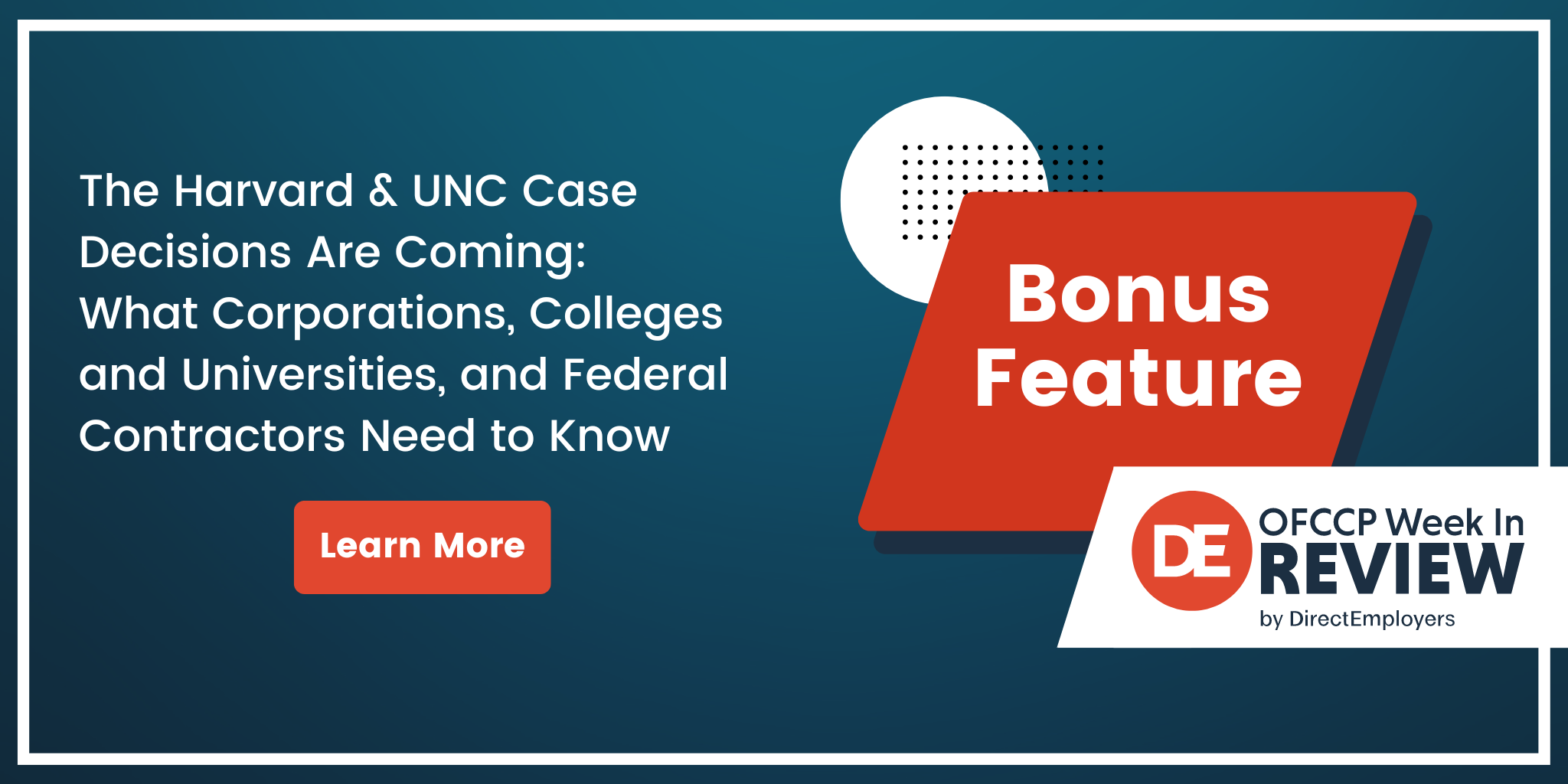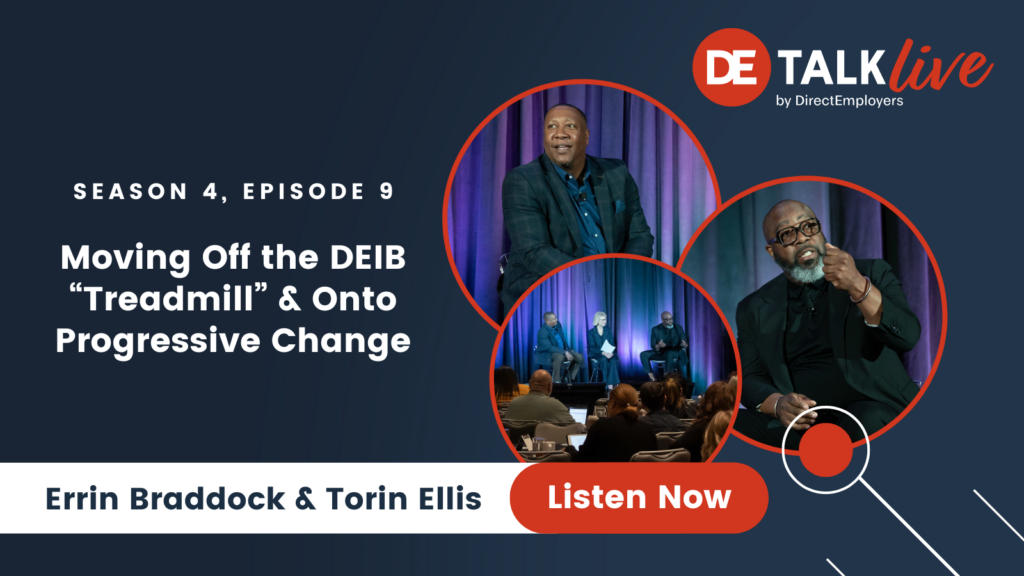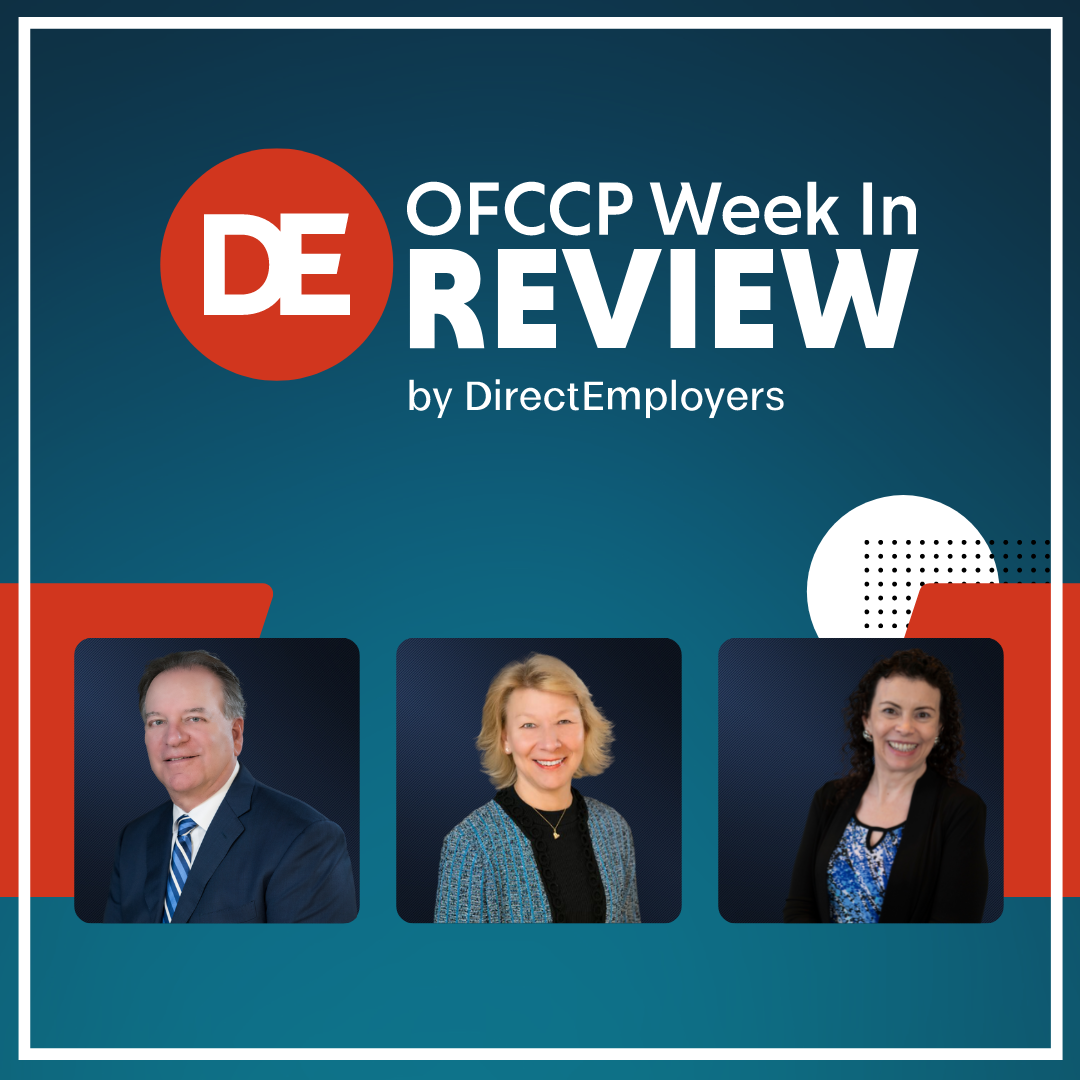
- The Harvard and UNC Case Decisions Are Coming: What Corporations, Colleges and Universities, and Federal Contractors Need to Know
- OMB Approved Changes to OFCCP Complaint Procedures to Take Effect in November
- DE Talk Podcast Focused on Moving Off the DEIB “Treadmill” & Onto Progressive Change
- President Biden Nominated Burrows for 3rd U.S. EEOC Commissioner Term
- In Brief
- Looking Ahead: Upcoming Date Reminders
What Corporations, Colleges and Universities, and Federal Contractors Need to Know About the Coming Harvard and UNC Case Decisions
I do not take a position either pro or con race-based admission decisions in this Blog, but rather want to accomplish three different things:
In Part I, below, I want to help prepare readers for the case decisions expected to come within the next two weeks (possibly tomorrow!) from the Supreme Court of the United States (“SCOTUS”) in the Harvard and University of North Carolina (“UNC”) cases by outlining the five possible outcomes which could come down from the Court.
In Part II, below, I provide thumbnail sketches of the legal holdings of the case decisions that frame and explain admission preferences law. These “thumbnails” include a discussion of the three areas of law in which the SCOTUS has approved a state or federal government’s use of race in decision-making. I also outline in this section the five primary SCOTUS discrimination law admission preference case decisions which have currently and uniquely authorized and framed the debate about the use of race in institutions of higher learning (i.e., colleges and universities) for the last 45 years and which have helped shape their admissions decisions.
In Part III, below, I describe, again–beyond my November 7, 2022, DirectEmployers Week In Review Blog – the three reasons the Harvard and UNC cases are improperly confused as “Affirmative Action” cases and why corporations and federal contractors should have little concern for the holdings of the coming case decisions regardless which of the five holdings the SCOTUS hands down.
Tuesday, June 13, 2023: OMB Approved Changes to OFCCP Complaint Procedures to Take Effect in November
Changes Will Mimic EEOC Process, Intended to Improve Efficiency
Current Single-Form Process Will Continue through October
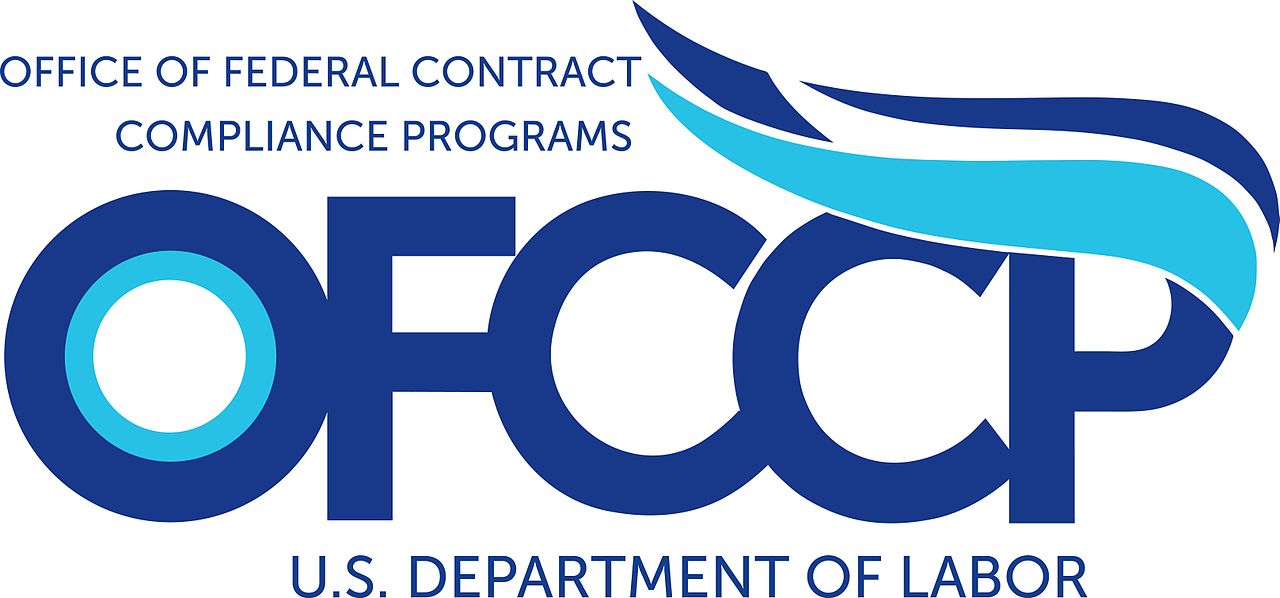
However, OMB’s “Notice of Action” approving the request states that: “OFCCP will continue to use its current complaint form until October 31, 2023, while the agency upgrades its electronic systems for complaint intake and translates the new forms into additional languages.” Our stories here and here discuss OFCCP’s original and modified proposals in detail.
OMB approval for the current Complaint Intake Form (Form CC-4) and process was set to expire on May 31, 2023. However, as the Notice of Action states, OMB has now approved OFCCP’s use of its current single-form Complaint process through October 31, 2023. OMB’s approval for the new two-step process will expire on June 30, 2026.
How Will the New Two-Step Process Work?
Starting in November, OFCCP will use two forms in sequence to provide OFCCP with a chance to first determine whether it properly has jurisdiction over the Complaint before engaging investigatory resources to determine the merits of the claim. Beginning in November 2023, OFCCP will therefore ask Complainants to first complete a new Form CC-390, entitled, “Pre-Complaint Inquiry for Employment Discrimination Involving a Federal Contractor or Subcontractor” and thereafter complete a revised Form CC-4 (which is OFCCP’s Complaint form) if OFCCP concludes it may have jurisdiction over any ensuing formal Complaint were the Complainant to file it.
The new two-step process will first require that applicants and employees of contractors, their authorized representatives, or third parties submit to OFCCP the newly created CC-390 pre-complaint inquiry providing basic information on the complainant’s allegation(s) and contact information. When OFCCP receives this form, the agency would then assess:
- whether the allegations are timely;
- whether the inquiry falls under OFCCP’s jurisdiction; and
- whether the inquiry should be investigated, closed, or referred to another agency.
If OFCCP then determines that it would refer the matter to another agency, OFCCP would provide the submitter with information on the referral and send a copy of the pre-complaint inquiry to the other agency for review. If OFCCP determines that the allegations provided in the pre-complaint inquiry were untimely or were not within OFCCP’s authority, it will contact the submitter to explain why OFCCP would likely not investigate the matter if he/she/they were to file a Complaint with OFCCP.
If OFCCP determines it has jurisdiction, the agency will then provide the inquiry submitter with information to file a Complaint with OFCCP using the revised Form CC-4. The revised Form CC-4 includes formatting changes (a) to make it consistent with the new “Pre-Complaint Inquiry” Form CC-390 and (b) to add clarifying revisions “to improve useability.”
Note that OFCCP has not yet published the finalized versions of either the new Form CC-390 or the revised Form CC-4 on its website. Moreover, the agency has not yet made any formal announcement of the upcoming change.
How We Got Here
On January 18, 2023, OFCCP published its 60-Day Federal Register Notice of the proposal, detailed in our story here. The 60-Day comment period closed on March 20, 2023, with three public comments submitted. On April 28, 2023, OFCCP published a follow-up Federal Register Notice of a 30-Day comment period on this proposal (as required by the Paperwork Reduction Act). For the 30-Day comment period, OFCCP made three minor changes in the proposal, detailed in our story here. The deadline for comments on the 30-Day Notice closed on May 30, 2023, with one comment submitted.
Tuesday, June 20, 2023: DE Talk Podcast Focused on Moving Off the DEIB “Treadmill” & Onto Progressive Change
If you were unable to attend DEAMcon23 in Chicago, you missed a powerful, unfiltered Diversity conversation with diversity strategist and activist Torin Ellis from t ellis brands and Errin Braddock, Enterprise’s Chief Diversity Officer. Workplaces are changing to focus on the strengths of more diverse and inclusive hiring. But how do you move past performative and into progressive change to create a space of belonging? Tune in to hear guidance from Torin and Errin as they share how to move off the DEIB “treadmill” activity that may make you feel good but doesn’t lead to transformation, and shift to actual progress forward. From training and accountability to AI and ChatGPT, these two cover the gamut of topics to discuss what’s impacting the diversity and inclusion landscape today.
Click here to listen now!
Listen to our DE Talk Podcasts via any of the options below and subscribe to receive updates whenever a new podcast is available.
Apple • Spotify • Google • Stitcher • iHeartRadio • Stitcher • TuneIn • Overcast • Pocket Casts• Castro • Castbox • Podchaser • RSS Feed
…or your preferred Podcast provider!
Wednesday, June 21, 2023: President Biden Nominated Burrows for 3rd U.S. EEOC Commissioner Term
Kalpana Kotagal Nomination for Commissioner Still Awaiting Senate Vote

If confirmed, Ms. Burrows’ third term will expire on July 1, 2028. Her current term expires on July 1, 2023. However, under Commission Rules, sitting Commissioners may remain in office until the end of the calendar year in which their term of office terms out, if the U.S. Senate does not previously confirm the President’s Nominee to replace a departing Commissioner.
Kotagal Nomination Still Awaiting Full Senate Vote
While the bi-partisan Commission has seats for five Members – three for the party currently in the White House, and two for the opposition party – it currently has only two members from each of the Republican and Democrat parties. Almost three months ago, on March 28, 2023, the U.S. Senate Committee on Health, Education, Labor, and Pensions (“HELP”) Committee voted to advance the controversial nomination of Kalpana Kotagal to fill the fifth EEOC Commissioner slot (see our story here.)
With Republican Janet Dhillon’s resignation from the Commission in early December 2022 (which we reported here), the five Member bi-partisan Committee is currently evenly staffed with 2 Democrats and 2 Republicans. This means that Chair Burrows cannot advance any new Commission policies without bi-partisan support from at least one of her Republican Commissioners.
So, far, Commission leadership has shown little appetite for bi-partisan agreement while awaiting Ms. Kotagal’s confirmation to allow the Chair to drive policies she prefers forward on a 3-2 Democrat Commissioner vote.
Should Ms. Kotagal’s nomination again fail, as it did in the last Congress, the 2-2 Democrat-Republican policy standoff would then continue until December 31, 2023, when Ms. Burrows would roll off the Commission if not confirmed by the U.S. Senate (requiring 51 Senatorial votes in favor of her Nomination. If only 50 Senators were to vote in favor of Ms. Burrows’ nomination, then she could nonetheless also be seated if Vice President Kamala Harris were to cast a tie-breaker vote in favor of Ms. Burrows (as would be expected if it comes down to a 50-50 tie on the Senate floor).
Depending on when, and if, the full Senate votes to approve the Kotagal nomination, Democrats will, for the first time in the Biden Administration, have a 3-2 voting majority on the Commission. However, if the Senate does not confirm Burrows’ or Kotagal’s nominations by the end of the year, the currently tied Commission could have a Republican majority for the second time during the Biden Administration.
Nominations Stalls and Snags
President Biden first nominated Ms. Kotagal on April 5, 2022, to replace Commissioner (and former Chair) Dhillon on the Commission. In September 2022, we reported that Ms. Kotagal’s nomination was a “Political Rugby Scrum in Progress” with the Commission majority at stake.
In June 2022, the President also nominated Karla Gilbride for the position as the EEOC General Counsel. The Senate failed to approve either the Kotagal or Gilbride nominations in the previous (117th) Congress which adjourned January 3rd of this year as the 118th Congress was seated. Nonetheless, President Biden re-nominated them both in January. In February, the Senate HELP Committee reported favorably on Gilbride’s nomination. (Our story is here).
However, even though the Kotagal and Gilbride nominations have now been pending for over a year, Senate Majority Leader Chuck Schumer (D-NY) has not yet scheduled either Ms. Kotagal or Ms. Gilbride for a full Senate floor vote. Given the passage of time since even their renewed nominations, it is clear that Senate Majority Leader Schumer still simply does not yet have the 50 votes needed to get either candidate to at least a tie-breaker vote to insure their confirmation(s).
Moreover, Majority Leader Schumer has much bigger “fish to fry” with the still pending nomination of Julie Su to be the next Secretary of Labor (a Presidential Cabinet nomination) as that also very controversial nomination now enters its fourth month of stalemate. We last wrote about that continuing drama here on June 12, 2023.
One wonders at what point the White House will recognize that a new reality has set in at the United States Senate and that the White House must accordingly “lower its sites” and nominate less controversial federal agency candidates capable of being confirmed pursuant to the “Advice and Consent” of the Senate. The setting in of that reality for Julie Su will likely come in late July if Majority Leader Schumer is unable by then to ramrod the 50 votes he needs soon after the July 4th Senate recess ends on July 17th. The timing of Acting Secretary Su’s confirmation process dictates the timing of the EEOC confirmations, if they are ever to occur, as we point out below.
At that point in mid-July when the Senate returns from its long Fourth of July break to resume business, the White House will have been in a self-described “daily” “war-room” conference for almost two-full months in a “maximum push” to get/find/cajole/coerce Acting Secretary of Labor Julie Su the 50 Senate votes she needs to be confirmed. At that point, the White House and Ms. Su will be half-way into their fifth month trying to find 50 votes (and at a time they appear to be at least four if not five Democrat Senator votes short of the needed 50). Myth of Sisyphus playing out?
At some point all the legislative ”log-rolling” the White House can offer the non-cooperating Democrat Senators will have been exhausted. And, at some point, additional White House offers of even more “pork” financial gifts to the states of the non-cooperating Democrat Senators (financial grants; highway monies; power plant funding; regulatory permits or relief to corporate contributors to the Senator’s Political Action Committee (PAC);–whatever the Senator wants) will become self-defeating as those Democrat Senators already cooperating with the White House on these controversial nominations will begin to wonder what they have to do to get their snouts in the feed trough too?
The Julie Su confirmation Cabinet Member process is important to the EEOC confirmation process because once Secretary Su either fails or wins confirmation (we think up or down by the end of July), the logjam of political appointee nominations will then break. Majority Leader Schumer will then start to work the Senate Floor to see if he can muscle through the Senate the lesser Presidential political appointee nominations, like Ms. Kotagal and Ms. Gilbride (and many others in the nomination process currently sitting in a holding pattern pending the outcome of Julie Su Presidential Cabinet nomination).
More Background: In mid-April, EEOC Vice Chair Jocelyn Samuels (Democrat) and Commissioner Keith E. Sonderling (Republican), in a “Fireside Chat” discussion at DEAMcon23 in Chicago, provided their insights into the Senate confirmation process. (See their comments here).
In Brief
Wednesday, June 21, 2023: GAO Reported That The Defense Department’s Civilian Workforce Lags On Its Diversity Metrics
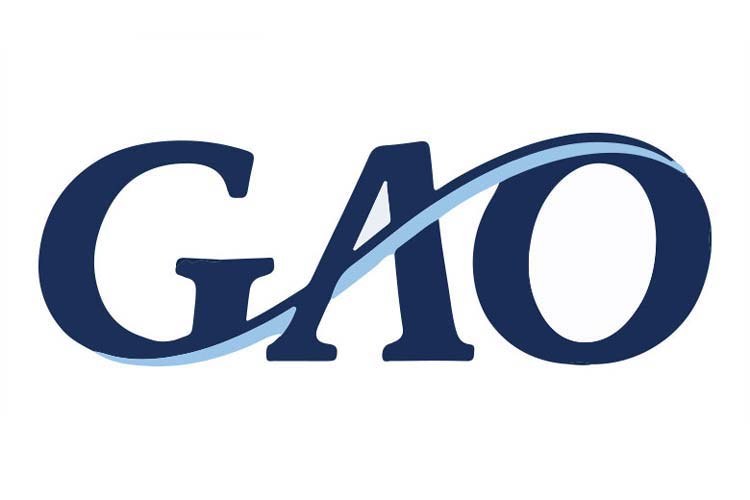
The GAO Report analyzed DOD data for appropriated-fund civilian employees in the three military departments (Army, Navy, and Air Force) and across the other DOD components from fiscal year (“FY”) 2012 through FY 2021. The GAO reported it had conducted a multivariate regression analysis of promotions by gender and racial or ethnic group. It also analyzed DOD diversity and Equal Employment Opportunity policies, strategic plans, and federal standards to analyze barriers and track progress.
While the DOD has been working to identify potential barriers to diversity, little has changed over the last 10 years, the GAO found. This may be because it is unclear which DOD office is responsible to overseeing such efforts, the GAO theorized. Accordingly, the GAO recommended that DOD (1) update policies to ensure it collects barrier-related data, (2) assign clear oversight roles, and (3) establish measures to track progress in eliminating barriers. The DOD concurred with these recommendations.
Thursday, June 22, 2023: New NIST Public Working Group on Generative AI Announced
How many more “Commissions”/ “Study Groups”/ “Working Groups” Can We Have Wringing Their Hands About Generalized Fears About AI?
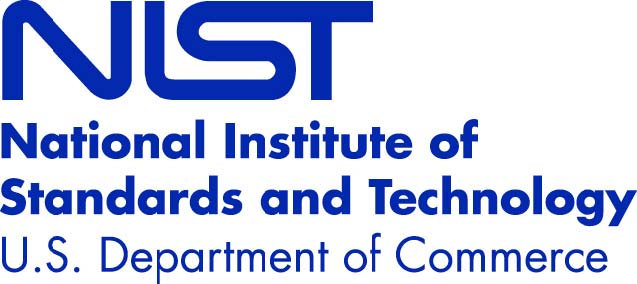
The Public Working Group on Generative AI will help address the opportunities and challenges associated with AI that can generate content, such as code, text, images, videos, and music. The Working Group will also help NIST develop key guidance to assist organizations to address the special risks associated with generative AI technologies, NIST reported. The group will draw upon volunteers, with technical experts from the private and public sectors. See the announcement for additional details on the short and long-term plans for the group, and how interested parties may join.
The AI RMF offers guidance to address the key building blocks of trustworthy AI for its creators to better manage risks to individuals, organizations, and society associated with AI tools. For more details on the AI RMF, see our story here. For more on Generative AI, see this recent report from the U.S. Government Accountability Office.

Looking Ahead:
Upcoming Date Reminders
June 2023: OFCCP’s current target date for its Final Rule on Pre-Enforcement Notice & Conciliation Procedures (RIN: 1250-AA14)
June 2023: U.S. DOL WHD’s current target date to publish its Final Rule on Nondisplacement of Qualified Workers Under Service Contracts (RIN: 1235-AA42)
June 2023: U.S. DOL WHD’s current target date for its Final Rule on Updating the Davis-Bacon and Related Acts Regulations (RIN: 1235-AA40)
June 2023: U.S. OSHA’s current target date to publish its Final Rule on Occupational Exposure to COVID-19 in Healthcare Settings (RIN: 1218-AD36)
Tuesday, June 27, 2023: The federal Pregnant Workers Fairness Act takes effect
Thursday, June 29, 2023: OFCCP’s asserted “Deadline” for covered federal Supply and Service contractors and subcontractors to certify, via OFCCP’s online Contractor Portal, that they have developed and maintained Affirmative Action Programs for each of the contractor’s/subcontractor’s establishments and/or functional units
August 2023: U.S. DOL WHD’s current target date for its Final Rule on Employee or Independent Contractor Classification Under the Fair Labor Standards Act (RIN: 1235-AA43)
August 2023: U.S. DOL WHD’s current target date for its Notice of Proposed Rulemaking on Defining and Delimiting the Exemptions for Executive, Administrative, Professional, Outside Sales and Computer Employees (RIN: 1235-AA39)
August 2023: U.S. NLRB’s target date for its Direct Final Rule on Quickie Election Procedures (RIN: 3142-AA18)
August 2023: U.S. NLRB’s current target date for its Final Rule on Standard for Determining Joint-Employer Status (under the NLRA) (RIN: 3142-AA21)
August 2023: U.S. NLRB’s current target date for its Final Election Protection Rule (RIN: 3142-AA22)
August 2023: U.S. DOL’s OASAM’s current target date to publish Proposed Rule on “Revision of the Regulations Implementing Section 188 of the Workforce Innovation and Opportunity Act (WIOA) to Clarify Nondiscrimination and Equal Opportunity Requirements and Obligations Related to Sex” (RIN: 1291-AA44)
Friday, August 11, 2023: Comments due on the EEOC’s proposal to extend – without change – the Information Collection Requirement (“ICR”) for the ADEA/OWBPA third-party waiver and disclosure requirements
Friday, August 11, 2023: Deadline for Presenter Proposal Submissions for DEAMCon 2024
December 2023: OFCCP’s current target date for its Notice of Proposed Rulemaking to “Modernize” Supply & Service Contractor Regulations (RIN: 1250-AA13)
December 2023: OFCCP’s current target date for its Final Rule on “Technical Amendments” to Update Jurisdictional Thresholds & Remove Gender Assumptive Pronouns (RIN: 1250-AA16)
December 29, 2023: Statutory deadline for EEOC regulations to enforce the Pregnant Workers Fairness Act
Wednesday, April 3 – Friday, April 5, 2024: DEAMcon24 New Orleans
June 2024: OFCCP’s current target date for its Notice of Proposed Rulemaking to Require Reporting of Subcontractors (RIN: 1250-AA15)
THIS COLUMN IS MEANT TO ASSIST IN A GENERAL UNDERSTANDING OF THE CURRENT LAW AND PRACTICE RELATING TO OFCCP. IT IS NOT TO BE REGARDED AS LEGAL ADVICE. COMPANIES OR INDIVIDUALS WITH PARTICULAR QUESTIONS SHOULD SEEK ADVICE OF COUNSEL.
SUBSCRIBE.
Compliance Alerts
Compliance Tips
Week In Review (WIR)
Subscribe to receive alerts, news and updates on all things related to OFCCP compliance as it applies to federal contractors.
OFCCP Compliance Text Alerts
Get OFCCP compliance alerts on your cell phone. Text the word compliance to 55678 and confirm your subscription. Provider message and data rates may apply.

